Articles
- Page Path
- HOME > Korean J Community Nutr > Volume 21(6); 2016 > Article
-
Research Article
- Application and the Effect of Nutrition Education Program Based on the Social Cognitive Theory Among Middle School Girls
-
Jihea Kim, Taejung Woo, Kyoung Ae Lee, Seung Min Lee, Kyung-Hea Lee

-
Korean Journal of Community Nutrition 2016;21(6):497-508.
DOI: https://doi.org/10.5720/kjcn.2016.21.6.497
Published online: December 31, 2016
1Department of Nutrition Education, Graduated School of Education, Changwon National University, Changwon, Korea.
2Department of Food and Nutrition, Changwon National University, Changwon, Korea.
3Department of Practical Arts Education and Centre for Child Nutrition Education, Busan National University of Education, Busan, Korea.
4Department of Food and Nutrition, Sungshin Woman's University, Seoul, Korea.
- Corresponding author: Kyung-Hea Lee. Department of Food and Nutrition, Changwon National University, 20 Changwondaehak-ro, Uichanggu, Changwon-si, Gyeongnam, 51140, Korea. Tel: (055) 213-3514, Fax: (055) 281-7480, khl@changwon.ac.kr
Copyright © 2016 The Korean Society of Community Nutrition
This is an Open-Access article distributed under the terms of the Creative Commons Attribution Non-Commercial License (http://creativecommons.org/licenses/by-nc/3.0/) which permits unrestricted non-commercial use, distribution, and reproduction in any medium, provided the original work is properly cited.
- 164 Views
- 5 Download
- 3 Crossref
Abstract
-
Objectives
- The purpose of this study was to evaluate the effect of nutrition education using materials based on social cognitive theory. Education topics focused on improving health-related and dietary self-awareness and behavior capability in adolescents.
-
Methods
- Participants were recruited from a middle school for girls; 67 students (educated group, n=34 and control group, n=33) participated. The education group received 12 lessons in club activity class. Self-administered surveys were conducted for each group before and after the nutrition education program. The questionnaires consisted of variables such as self-efficacy, outcome expectation, outcome expectancy, knowledge, and dietary practices based on the social cognitive theory. Education satisfaction was evaluated using a five-point Likert scale for two sections: a) teaching and learning and b) education results. The data were analyzed using a t-test and Chi Square-test (significance level: p < 0.05).
-
Results
- In the education group, post-education, there were significant differences in self-efficacy (p < 0.05), knowledge (p < 0.01), and dietary practices (p < 0.05), whereas outcome expectation and expectancy did not show any significant differences. None of the variables showed any significant differences in the control group. Educational satisfaction scores were 4.38 ± 0.12 (teaching and learning) and 4.14 ± 0.15 (education results).
-
Conclusions
- This study showed that improving adolescent's awareness and behavior capability has a positive effect on their dietary practices. Moreover, this study suggested that a theory-based determinant should be considered to improve dietary behavior among adolescents.
Acknowledgments
Acknowledgments
- 1. Lee KH, Kim GW, Lee YK, Lee SM, Son SM. Nutrition education and counselling. 3rd ed. Seoul: Life Science Publishing Co.; 2015. p. 22. p. 27. p. 275. p. 353.
- 2. Ministry of Health and Welfare & Korea Centers for Disease Control and Prevention. Korea National Health and Nutrition Examinatio n Survey (KNHANES VI-2) [Internet]. Korea Health Statistics; 2015; [cited 2016 Nov 9]]. Available from: http://knhanes.cdc.go.kr.
- 3. Korea Centers for Disease Control and Prevention. The 11th Korea Youth Risk Behavior Web-based Survey. 2015; [cited 2016 Nov 9]]. Available from: http://yhs.cdc.go.kr.
- 4. Han MR, Lim JH, Song YJ. The effect of high-carbohydrate diet and low-fat diet for the risk factors of metabolic syndrome in Korean adolescents: Using the Korean National Health and Nutrition Examination Surveys (KNHANES) 1998-2009. J Nutr Health 2014; 47(3): 186-192.Article
- 5. Lee YA, Shin CH, Lim JS. Measures against pediatric metabolic syndrome. J Korean Med Assoc 2010; 53(5): 392-406.Article
- 6. Moon SM. Educational psychology. Paju: Yangseowon; 2014. p. 161-166.
- 7. Han SY. A study of relationship among physical symptoms, mental health according to stress factors of middle school students. J Korea Acad Ind Coop Soc 2012; 13(12): 5800-5807.Article
- 8. Jeong IG, Nam GO, Kim JH. The effects of academic stress on dietary behavior in junior high school students. Korean Educ Inq 2012; 30(3): 125-143.
- 9. Truswell AS, Darnton-Hill I. Food habits of adolescents. Nutr Rev 1981; 39(2): 73-88.ArticlePubMed
- 10. Ministry of Gender Equality & Family. Development of action plans for improving adolescents' health. 2012; [cited 2015 Feb 9]]. Available from: http://www.mogef.go.kr/korea/view/policy/policy02_01g.jsp?func=view&idx=642924.
- 11. Kang YH, Yang IS, Kim HY, Lee HY. Identifying the subjects of nutrition education for junior and senior high school students. Korean J Nutr 2004; 37(10): 938-945.
- 12. Lee KH, Lee KA, Lee SM, Woo TJ. Evaluation of dietary education's effect on dietary awareness and practices in adolescents. Ministry of Food and Drug Safety Research report. 2014. Report No. 14162MFDS130.
- 13. Son SM, Lee KH, Kim KW, Lee YK. Nutrition education and counselling. . Seoul: Life Science Publishing Co.; 2009. p. 49-50.
- 14. Dewar DL, Lubans DR, Plotnikoff RC, Morgan PJ. Development and evaluation of social cognitive measures related to adolescent dietary behaviors. Int J Behav Nutr Phys Act 2012; 9: 36.ArticlePubMedPMCPDF
- 15. Woo T, Lee KH. Effects of sensory education based on classroom activities for lower grade school children. Nutr Res Pract 2013; 7(4): 336-341.ArticlePubMedPMC
- 16. Contento IR. Nutrition education linking research, theory, and practice. 3rd ed. MA: Jones & Bartlett Learning; 2015. p. 13. p. 138-139. p. 177-179. p. 310-331.
- 17. Lee JS, Yun JW. A study on perception about body image, dietary attitude, dietary self-efficacy and nutrient intake of high school students in Busan. J Korean Soc Food Sci Nutr 2003; 32(2): 295-301.Article
- 18. Suh Y, Chung Y. Comparison of mineral and vitamin intakes according to the stage of change in fruit and vegetable intake for elementary school students in Chungnam province. Korean J Nutr 2008; 41(7): 658-666.
- 19. Granner ML, Evans AE. Measurement properties of psychosocial and environmental measures associated with fruit and vegetable intake among middle school adolescents. J Nutr Educ Behav 2012; 44(1): 2-11.ArticlePubMed
- 20. Woo TJ, Lee HJ, Lee KA, Lee SM, Lee KH. Gender differences in adolescents' dietary perceptions and practices. Korean J Community Nutr 2016; 21(2): 165-177.ArticlePDF
- 21. Yu NH, Kim MJ, Han JS. A study on the food intake frequency, dietary habits and nutrition knowledge of middle school students who like sweets in Busan. J Korean Soc Food Sci Nutr 2007; 36(6): 735-744.Article
- 22. Kim JS, Kim YN. Body perception, dietary attitude and selfesteem in middle school boys and girls. J Korean Home Econ Educ Assoc 2009; 21(2): 123-139.
- 23. Molaison EF, Connell CL, Stuff JE, Yadrick MK, Bogle M. Influences on fruit and vegetable consumption by low-income black American adolescents. J Nutr Educ Behav 2005; 37(5): 246-251.ArticlePubMed
- 24. Kwon MS, Cho HR, Park DJ. A comparison between Seoul and Gangwon-do in elementary students' eating habits and their mothers' parenting attitude toward eating habits. Korean J Health Educ Promot 2013; 30(5): 101-112.Article
REFERENCES
Comparison nutrition knowledge between groups

1) P1: paired t-test between Pre-test and Post-test
2) PΔ: paired t-test for changes in parameters between educated group and control group
3) Mean±SE, Total score: 22 (0=wrong answer, 1=right answer; food choice score-10; intake control score-5; meal plan score-3; meal preparation score-4)
4) NS: No significance
Figure & Data
REFERENCES
Citations

- Awareness and Practice of Sugar Reduction in School Foodservice and the Practice of Nutrition Education in Daegu
Suhyang Jang, Kilye Kim, Yeon-Kyung Lee
Korean Journal of Community Nutrition.2021; 26(3): 167. CrossRef - Effect of Dietary Education Experience (Home, School, and Mass Media) on Food Consumer Information literacy
Ji Eun Kim, Kyoung Sook Choi
Korean Journal of Community Nutrition.2019; 24(5): 363. CrossRef - Factors affecting preference of vegetable in elementary school students: based on social cognitive theory
Su Hyeon Cha, Ho Kyung Ryu
Journal of Nutrition and Health.2019; 52(3): 285. CrossRef
Nutrition education strategies, goals and activities based on the social cognitive theory
1) SCT: Social cognitive theory
Characteristics of the study subject groups
1) N (%)
Comparison self-efficacy between groups
1) P1: independent t-test between Pre-test and Post-test
2) PΔ: paired t-test for changes in parameters between educated group and control group
3) Mean±SE, 4 Likert (1=strongly disagree, 2=disagree, 3= agree, 4= strongly agree)
4) NS: No significance
Comparison outcome expectation and outcome expectancies between groups
1) P1: independent t-test between Pre-test and Post-test
2) PΔ: paired t-test for changes in parameters between educated group and control group
3) Mean±SE, 4 Likert (1=strongly disagree, 2=disagree, 3=agree, 4=strongly agree)
4) NS: No significance
Comparison nutrition knowledge between groups
1) P1: paired t-test between Pre-test and Post-test
2) PΔ: paired t-test for changes in parameters between educated group and control group
3) Mean±SE, Total score: 22 (0=wrong answer, 1=right answer; food choice score-10; intake control score-5; meal plan score-3; meal preparation score-4)
4) NS: No significance
Comparison of dietary practice between groups
1) P1: independent t-test between Pre-test and Post-test
2) PΔ: paired t-test for changes in parameters between educated group and control group
3) Mean±SE, (5 Likert; 1=never, 2=hardly, 3=sometimes, 4=usually, 5=always)
4) NS: No significance
Nutrition education satisfaction in the educated group
1) 5 Likert (1=strongly disagree, 2=disagree, 3=Normal, 4=agree, 5=strongly agree)
1) SCT: Social cognitive theory
1) N (%)
1) P1: independent t-test between Pre-test and Post-test 2) PΔ: paired t-test for changes in parameters between educated group and control group 3) Mean±SE, 4 Likert (1=strongly disagree, 2=disagree, 3= agree, 4= strongly agree) 4) NS: No significance
1) P1: independent t-test between Pre-test and Post-test 2) PΔ: paired t-test for changes in parameters between educated group and control group 3) Mean±SE, 4 Likert (1=strongly disagree, 2=disagree, 3=agree, 4=strongly agree) 4) NS: No significance
1) P1: paired t-test between Pre-test and Post-test 2) PΔ: paired t-test for changes in parameters between educated group and control group 3) Mean±SE, Total score: 22 (0=wrong answer, 1=right answer; food choice score-10; intake control score-5; meal plan score-3; meal preparation score-4) 4) NS: No significance
1) P1: independent t-test between Pre-test and Post-test 2) PΔ: paired t-test for changes in parameters between educated group and control group 3) Mean±SE, (5 Likert; 1=never, 2=hardly, 3=sometimes, 4=usually, 5=always) 4) NS: No significance
1) 5 Likert (1=strongly disagree, 2=disagree, 3=Normal, 4=agree, 5=strongly agree)

 KSCN
KSCN
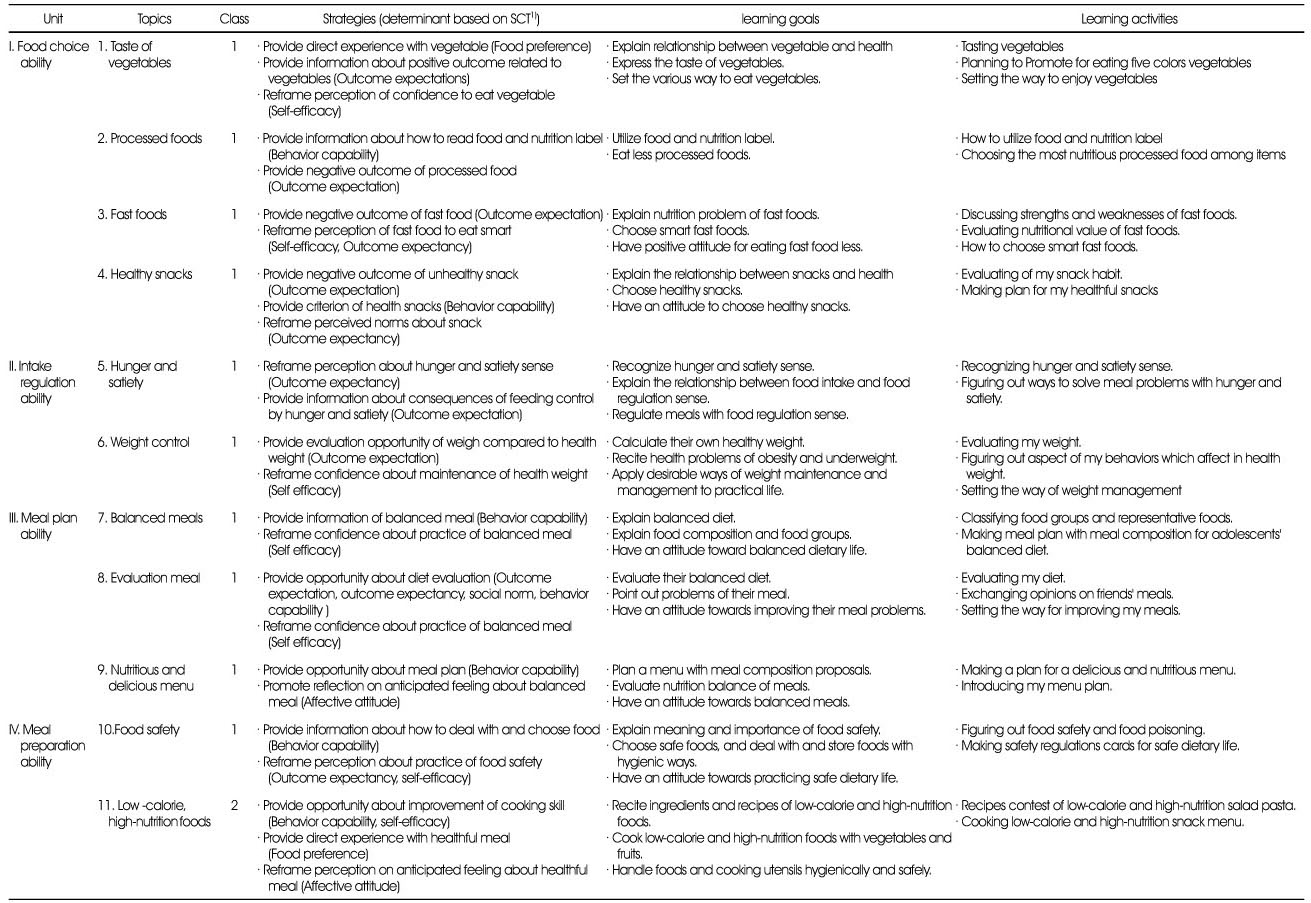
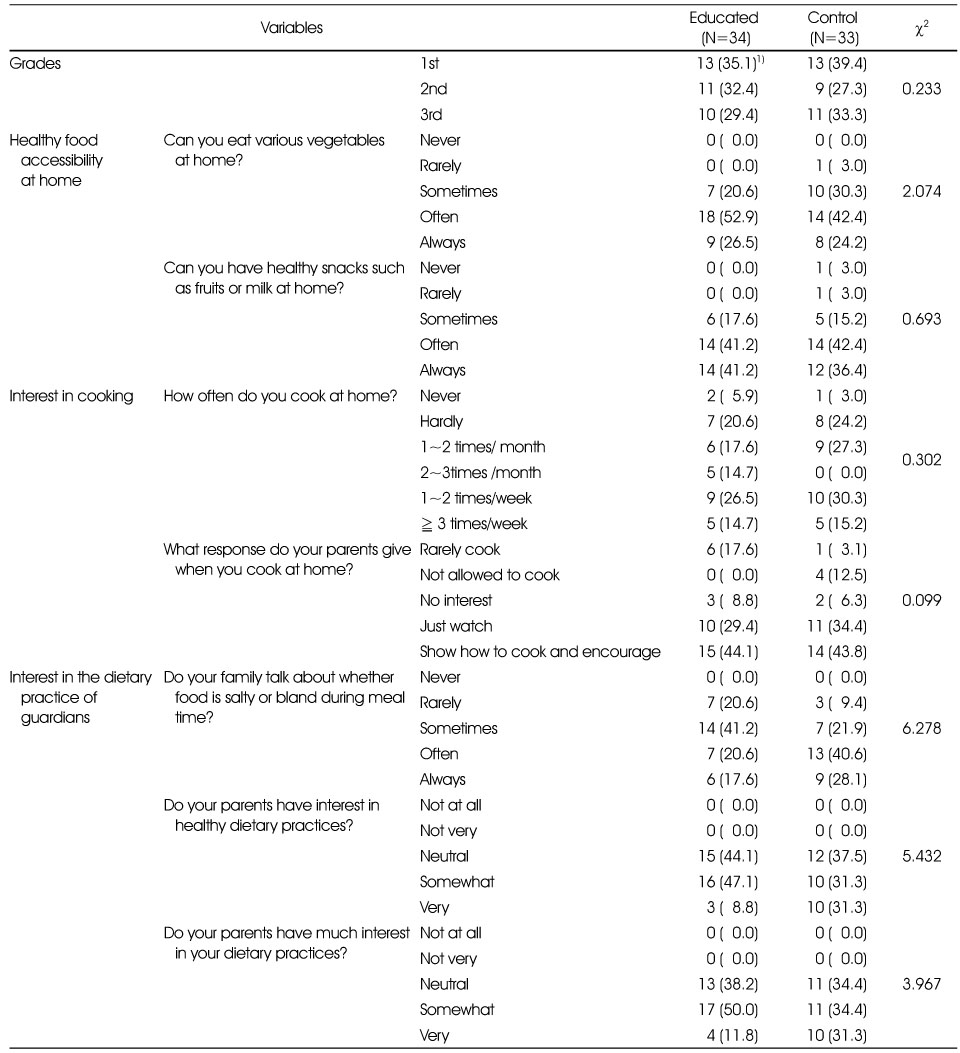
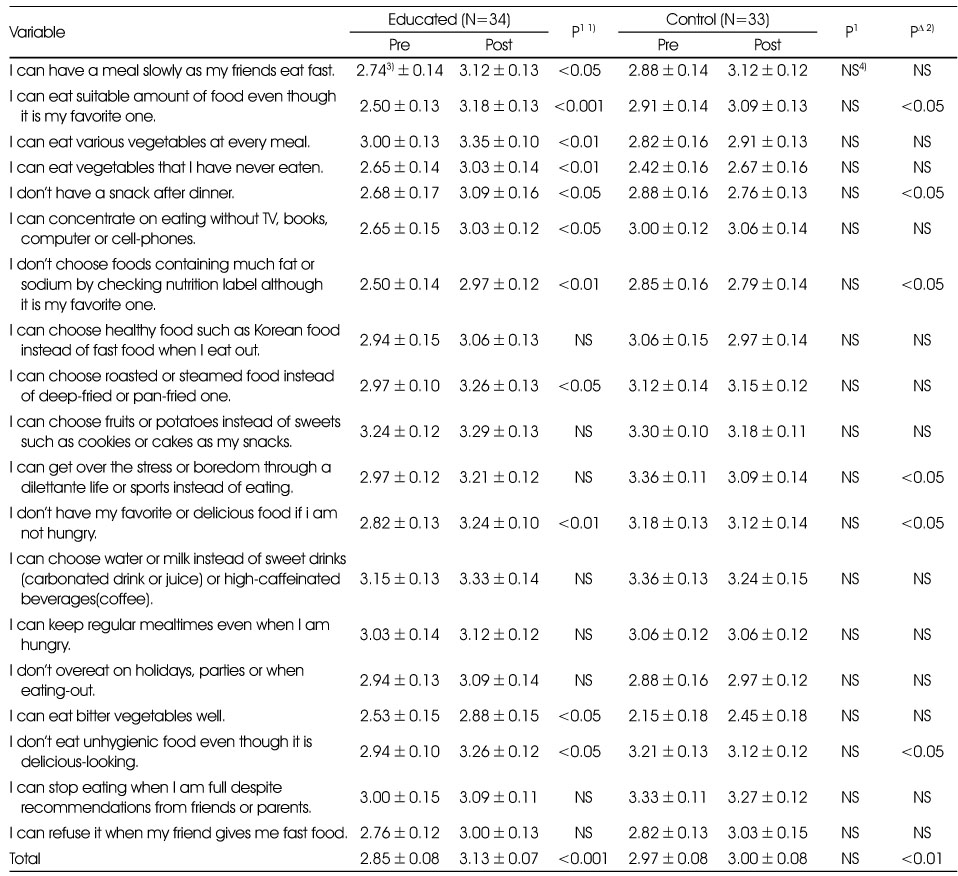
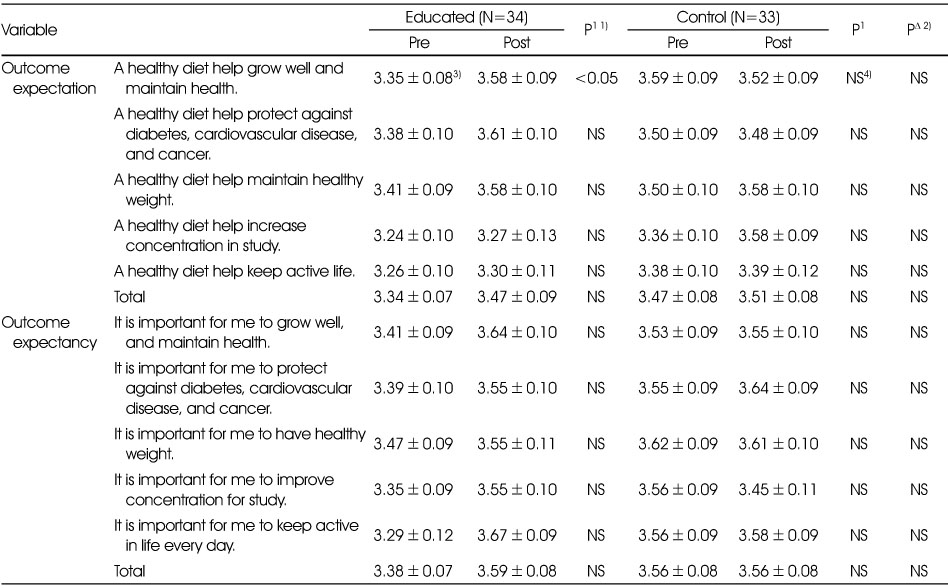
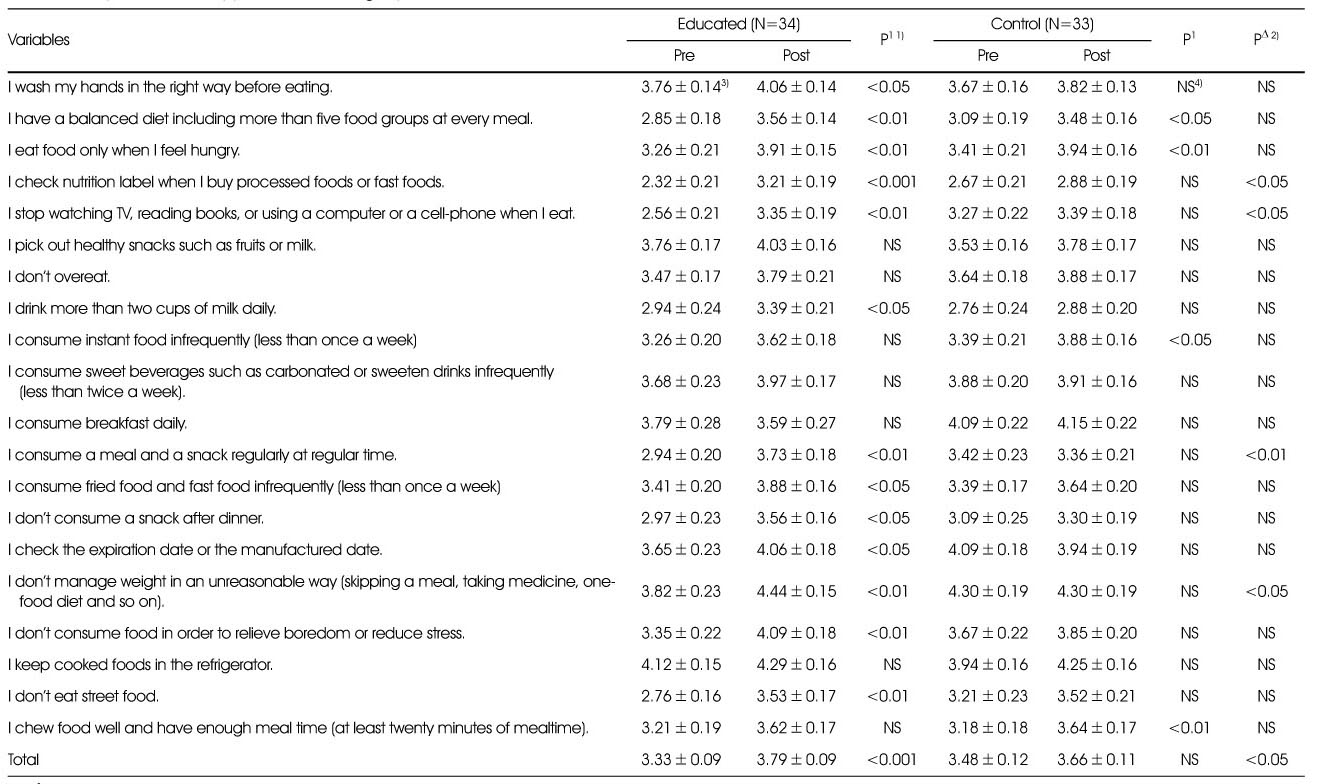
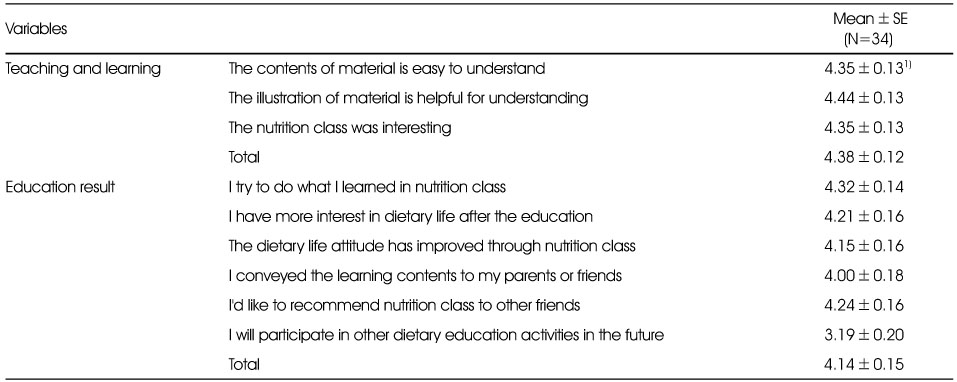
 PubReader
PubReader Cite
Cite


